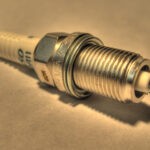How Much Does an Alternator Weigh? (The Facts)
If like the majority of other people, you think that all the appliances and components in your car are powered by the battery, you might be wrong, at least technically. There’s another very crucial component in your car’s engine bay that generates all the electricity, powers all the appliances, and charges that battery as well.
It is called the alternator, and the melon-sized component is the power grid of your car. What is an alternator, how does it work, how much does an alternator weigh, and what are the different manufacturers you ought to know? I have answers to all these queries, so start reading and know everything about a car alternator.
What is an Alternator? How Does It Work?
An alternator is a wonder component that generates electricity in your car and powers all the appliances. So how does it do that? Does it use fuel or some other source? Well, the alternator uses kinetic energy and converts it into electrical energy.
In simple words, it is connected to the crankshaft of the engine via a serpentine belt which rotates when the engine is running. It generates electric current, exactly the same way as in a turbine. The rotor inside the alternator works as a turbine and generates electric current inside the stator.
This current then passes through a voltage reducer and powers all the components and charges the battery as well. The battery only helps start the car on ignition and supply power only when the engine is off. At all other times, especially when driving, it is the alternator that provides electric current and you comfortably use the A/C, infotainment system, power windows, radio, and other onboard appliances in your car.
Also read: Is Replacing an Alternator Hard? (5 Easy Steps)
How Does the Alternator Charge the Car Battery?
The electricity generated by the alternator must first be transformed to a form that is compatible with the battery before it can be directed towards it and used. This is due to the fact that electricity can travel in many forms and currents.
Direct current (DC) electricity, which is used by car batteries, is one-way. However, alternators produce alternating current (AC), which periodically flows in the opposite direction and is totally opposite of (DC).
Therefore, the power destined for the battery, generated by the alternator must pass through a module called a diode rectifier to convert to DC before going to the voltage regulator and then to the battery. The battery can only use the electricity to recharge after this conversion is done.
What is the Average Weight of an Alternator?
A car alternator weighs 12-15 lbs on average and is a small device located near the front side of the engine bay. Most alternators in cars weigh 15 lbs, but those in other automobiles, such as a truck, heavy-duty commercial vehicles, and other transport can vary in weightage and weigh up to 25 lbs as well.
Are There Any Significantly “Lightweight” Alternator Models Out There?
Although the standard average weight of 15 lbs isn’t too bad, if you’re looking for even compact and lightweight alternator models out there, you’re in luck. There are some options in the aftermarket that can be considered significantly lightweight and they weigh just 5-7 lbs and offer good power for routine usage.
BOSCH alternator is one such example that is 132 amps rated and weighs just 5 lbs. German quality with such low price and high power it is one of the best lightweight alternators on the market right now.
Also read: Are Junkyard Alternators Good? What Should You Look for?
What Can Be the Maximum Weight of an Alternator?
Although the average weight of car alternators is around 15 lbs, there is a limit to what an alternator should weigh. The maximum weight of a car alternator cannot be more than 25 lbs, as it becomes too heavy and the wastage increase too much.
The components inside an alternator do not weigh too much and are small in size, keeping the weight to a minimum.
What are the Quality Brands of an Alternator?
If you’re looking to replace your car alternator and confused about good options, it is important that you know some quality brands, and do not fall for sub-standard or cheaper alternatives.
1- DB Electrical Alternator
With a top-quality build and long-term durability, it is one of the best alternators that you could get. Rated at 145 AMP and fitting most vehicles, it is ideal for trucks and other rugged vehicles, such as GMC Sierra, Hummer, and Cadillac Escalade.
2- Denso Alternator
Manufactured after rigorous testing and compatible with the majority of makes and models, you cannot just ignore this alternator from the very well-known manufacturer Denso. It is rated at 100 AMP and is a very robust alternator.
3- BOSCH Alternator
Like German cars, this German alternator needs no pitching. With 100% pure parts, 132 amps of power, and capable of high current passage, it is one of the best alternators that you should consider. Most importantly, its weight of just 5 lb is super difficult to ignore and makes a great choice.
How Does Shipping Cost Change with the Weight of the Alternator?
Most Shipping companies charge according to weight and region. If your destination is a bit far located and your alternator weighs more, it is definitely going to cost you more.
For instance, shipping a 5 lbs alternator and a 20 lbs alternator cannot cost the same, and if you’re receiving it on the east coast, sent by a shipper located on the west coast, be prepared to pay more.
What are the Signs of a Bad Alternator?
As it is the main powerhouse of your car, a bad alternator would show some definite signs of aging or malfunction. So look for a quality replacement if you notice these signs;
- The most important sign would be the electronic appliances stalling, lights flickering, and A/C turning on and off.
- Engine stalling.
- Battery not charging and going dead continuously.
- Crackling or knocking sounds from the front side of the engine.
- Most obviously, the check engine light coming on or blinking.






